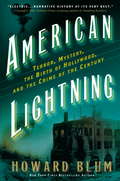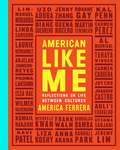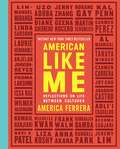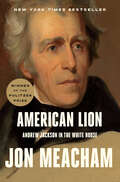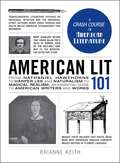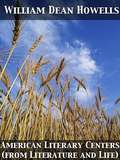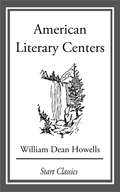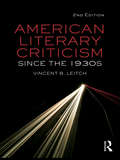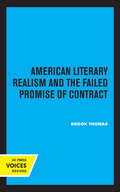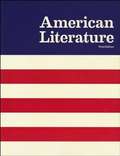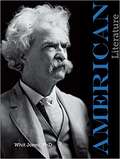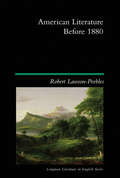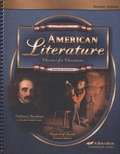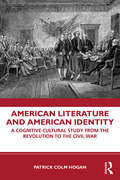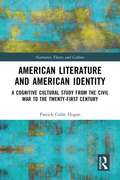- Table View
- List View
American Lightning: Terror, Mystery, and the Birth of Hollywood
by Howard BlumIt was an explosion that reverberated across the country--and into the very heart of early-twentieth-century America. On the morning of October 1, 1910, the walls of the Los Angeles Times Building buckled as a thunderous detonation sent men, machinery, and mortar rocketing into the night air. When at last the wreckage had been sifted and the hospital triage units consulted, twenty-one people were declared dead and dozens more injured. But as it turned out, this was just a prelude to the devastation that was to come. In American Lightning, acclaimed author Howard Blum masterfully evokes the incredible circumstances that led to the original "crime of the century"--and an aftermath more dramatic than even the crime itself. With smoke still wafting up from the charred ruins, the city's mayor reacts with undisguised excitement when he learns of the arrival, only that morning, of America's greatest detective, William J. Burns, a former Secret Service man who has been likened to Sherlock Holmes. Surely Burns, already world famous for cracking unsolvable crimes and for his elaborate disguises, can run the perpetrators to ground. Through the work of many months, snowbound stakeouts, and brilliant forensic sleuthing, the great investigator finally identifies the men he believes are responsible for so much destruction. Stunningly, Burns accuses the men--labor activists with an apparent grudge against the Los Angeles Times' fiercely anti-union owner--of not just one heinous deed but of being part of a terror wave involving hundreds of bombings. While preparation is laid for America's highest profile trial ever--and the forces of labor and capital wage hand-to-hand combat in the streets--two other notable figures are swept into the drama: industry-shaping Filmmaker D. W. Griffith, who perceives in these events the possibility of great art and who will go on to alchemize his observations into the landmark film The Birth of a Nation; and crusading lawyer Clarence Darrow, committed to lend his eloquence to the defendants, though he will be driven to thoughts of suicide before events have fully played out. Simultaneously offering the absorbing reading experience of a can't-put-it-down thriller and the perception-altering resonance of a story whose reverberations continue even today, American Lightning is a masterpiece of narrative nonfiction.
American Like Me: Reflections on Life Between Cultures
by America FerreraAn emotionally and politically charged collection of first person accounts from prominent citizens in a variety of fields about their experiences being first generation Americans, with a powerful foreword written by actress and activist America Ferrera. From award-winning actress and political activist America Ferrera comes an absorbing and fascinating collection of essays written by prominent Americans from a variety of fields about their experiences being first generation Americans. As the daughter of Honduran immigrants, Ferrara is enthusiastic to share dozens of personal stories from notable actors, comedians, athletes, politicians, artists and entrepreneurs about assimilating into American culture while remaining inextricably connected to the mother tongue and the father land. Contributors to the book will include Lin-Manuel Miranda, Roxane Gay, Issa Rae, Kal Penn, Padma Lakshmi, Liza Koshy, Uzo Aduba, Al Madrigal, Anjelah Johnson, Carmen Perez, Wilmer Valderrama, Kumail Nanjiani, Jeremy Lin, Joy Cho, Jenny Zhang, Laurie Hernandez, Michelle Kwan, Ravi Patel, and many others. Ranging from heartfelt to hilarious, the essays in AMERICAN LIKE ME will appeal to anyone from a first generation family; those interested in identity, particularly national identity; and anyone with a complicated relationship to family, culture, and growing up.
American Like Me: Reflections on Life Between Cultures
by America FerreraFrom award-winning actress and political activist America Ferrera comes a vibrant and varied collection of first person accounts from prominent figures about the experience of growing up between cultures. <P><P>America Ferrera has always felt wholly American, and yet, her identity is inextricably linked to her parents’ homeland and Honduran culture. Speaking Spanish at home, having Saturday-morning-salsa-dance-parties in the kitchen, and eating tamales alongside apple pie at Christmas never seemed at odds with her American identity. Still, she yearned to see that identity reflected in the larger American narrative. <P><P>Now, in American Like Me, America invites thirty-one of her friends, peers, and heroes to share their stories about life between cultures. We know them as actors, comedians, athletes, politicians, artists, and writers. However, they are also immigrants, children or grandchildren of immigrants, indigenous people, or people who otherwise grew up with deep and personal connections to more than one culture. <P><P>Each of them struggled to establish a sense of self, find belonging, and feel seen. And they call themselves American enthusiastically, reluctantly, or not at all. Ranging from the heartfelt to the hilarious, their stories shine a light on a quintessentially American experience and will appeal to anyone with a complicated relationship to family, culture, and growing up. <P><b>A New York Times Bestseller</b>
American Lion: Andrew Jackson in the White House
by Jon MeachamAndrew Jackson, his intimate circle of friends, and his tumultuous times are at the heart of this remarkable book about the man who rose from nothing to create the modern presidency. Beloved and hated, venerated and reviled, Andrew Jackson was an orphan who fought his way to the pinnacle of power, bending the nation to his will in the cause of democracy. Jackson's election in 1828 ushered in a new and lasting era in which the people, not distant elites, were the guiding force in American politics. Democracy made its stand in the Jackson years, and he gave voice to the hopes and the fears of a restless, changing nation facing challenging times at home and threats abroad. To tell the saga of Jackson's presidency, acclaimed author Jon Meacham goes inside the Jackson White House. Drawing on newly discovered family letters and papers, he details the human drama-the family, the women, and the inner circle of advisers-that shaped Jackson's private world through years of storm and victory. One of our most significant yet dimly recalled presidents, Jackson was a battle-hardened warrior, the founder of the Democratic Party, and the architect of the presidency as we know it. His story is one of violence, sex, courage, and tragedy. With his powerful persona, his evident bravery, and his mystical connection to the people, Jackson moved the White House from the periphery of government to the center of national action, articulating a vision of change that challenged entrenched interests to heed the popular will-or face his formidable wrath. The greatest of the presidents who have followed Jackson in the White House-from Lincoln to Theodore Roosevelt to FDR to Truman-have found inspiration in his example, and virtue in his vision. Jackson was the most contradictory of men. The architect of the removal of Indians from their native lands, he was warmly sentimental and risked everything to give more power to ordinary citizens. He was, in short, a lot like his country: alternately kind and vicious, brilliant and blind; and a man who fought a lifelong war to keep the republic safe-no matter what it took. Jon Meacham in American Lion has delivered the definitive human portrait of a pivotal president who forever changed the American presidency-and America itself.<P><P> Pulitzer Prize Winner
American Lit 101: From Nathaniel Hawthorne to Harper Lee and Naturalism to Magical Realism, an essential guide to American writers and works
by Brianne KeithFrom poetry to fiction to essays, American Lit 101 leaves no page unturned! Edgar Allan Poe. Willa Cather. Henry David Thoreau. Mark Twain. The list of important American writers goes on and on. These voices played a vital role in shaping the scope of American literature, and the United States itself. But too often, textbooks reduce this storied history to dry text that would put even a tenured professor to sleep.American Lit 101 is an engaging and comprehensive guide through the major players in American literature. From colonialism to postmodernism and every literary movement in between, this primer is packed with hundreds of entertaining tidbits and concepts, along with easy-to-understand explanations on why each author's work was important then and still relevant now. So whether you're looking for a refresher course on key American literature or want to learn about it for the first time, American Lit 101 has all the answers--even the ones you didn't know you were looking for.
American Literary Centers (from Literature and Life)
by William Dean HowellspubOne. info present you this new edition. One of the facts which we Americans have a difficulty in making clear to a rather inattentive world outside is that, while we have apparently a literature of our own, we have no literary centre. We have so much literature that from time to time it seems even to us we must have a literary centre. <P> <P> We say to ourselves, with a good deal of logic, Where there is so much smoke there must be some fire, or at least a fireplace. But it is just here that, misled by tradition, and even by history, we deceive ourselves. Really, we have no fireplace for such fire as we have kindled; or, if any one is disposed to deny this, then I say, we have a dozen fireplaces; which is quite as bad, so far as the notion of a literary centre is concerned, if it is not worse.
American Literary Centers: From 'Literature and Life'
by William Dean HowellsWilliam Dean Howells (March 1, 1837 - May 11, 1920) was an American realist author and literary critic... In 1858, he began to work at the Ohio State Journal where he wrote poetry, short stories, and also translated pieces from French, Spanish, and German. He avidly studied German and other languages and was greatly interested in Heinrich Heine. In 1860, he visited Boston and met with American writers James Thomas Fields, James Russell Lowell, Oliver Wendell Holmes, Nathaniel Hawthorne, Henry David Thoreau, and Ralph Waldo Emerson. Said to be rewarded for a biography of Abraham Lincoln used during the election of 1860, he gained a consulship in Venice. On Christmas Eve 1862, he married Elinor Mead at the American embassy in Paris. Upon returning to the U.S., he wrote for various magazines, including Atlantic Monthly and Harper's Magazine. From 1866, he became an assistant editor for the Atlantic Monthly and was made editor in 1871, remaining in the position until 1881. In 1869, he first met Mark Twain, which sparked a longtime friendship. Even more important for the development of his literary style--his advocacy of Realism--was his relationship with the journalist Jonathan Baxter Harrison, who in the 1870s wrote a series of articles for the Atlantic Monthly on the lives of ordinary Americans. He wrote his first novel, Their Wedding Journey, in 1872, but his literary reputation took off with the realist novel A Modern Instance, published in 1882, which described the decay of a marriage. His 1885 novel The Rise of Silas Lapham is perhaps his best known, describing the rise and fall of an American entrepreneur in the paint business. His socialviews were also strongly reflected in the novels Annie Kilburn (1888) and A Hazard of New Fortunes (1890). He was particularly outraged by the trials resulting from the Haymarket Riot
American Literary Criticism Since the 1930s
by Vincent B. LeitchAmerican Literary Criticism Since the 1930s fully updates Vincent B. Leitch’s classic book, American Literary Criticism from the 30s to the 80s following the development of the American academy right up to the present day. Updated throughout and with a brand new chapter, this second edition: provides a critical history of American literary theory and practice, discussing the impact of major schools and movements examines the social and cultural background to literary research, considering the role of key theories and practices provides profiles of major figures and influential texts, outlining the connections among theorists presents a new chapter on developments since the 1980s, including discussions of feminist, queer, postcolonial and ethnic criticism. Comprehensive and engaging, this book offers a crucial overview of the development of literary studies in American universities, and a springboard to further research for all those interested in the development and study of Literature.
American Literary Realism and the Failed Promise of Contract
by Brook ThomasThis title is part of UC Press's Voices Revived program, which commemorates University of California Press’s mission to seek out and cultivate the brightest minds and give them voice, reach, and impact. Drawing on a backlist dating to 1893, Voices Revived makes high-quality, peer-reviewed scholarship accessible once again using print-on-demand technology. This title was originally published in `1997.
American Literary Studies
by Michael A. Elliott Claudia StokesAmerican Literary Studies: A Methodological Reader gathers together leading scholars of American literature to address the questions of methodology that have invigorated and divided their field: the rise of interdisciplinarity and the wealth of theoretical methods now available to the critic of American literature. Their engagement with these issues takes a unique form in this book: Each scholar has chosen a methodologically innovative essay, which he or she then introduces, explaining why it is both exemplary in its approach and central to the issues that most engage American literary scholarship today. The book includes both an introduction to the controversial interdisciplinary methods that have made American literary studies such a vibrant field, as well as groundbreaking scholarship on topics as diverse as James Fenimore Cooper, minstrel songs, and Lakota Indian stories. This volume has been designed to serve as a starting point for teachers and students to explore the fundamental questions of American literary scholarship: What does "method" mean in literary studies? Which texts should it study? What makes literary study unique? What should literary scholarship do? American Literary Studies argues that these questions can only be answered through a discussion of the interdisciplinary methods currently in use by scholars today. Finally, an original introduction by Michael A. Elliott and Claudia Stokes explains why questions of method are crucial to American literary studies and how past scholars of American literature have tried to answer them. Contributors include: Lauren Berlant, Russ Castronovo, Wai Chee Dimock, Ann duCille, Michael A. Elliott, Frances Smith Foster, Elaine A. Jahner, Rob Kroes, Arnold Krupat, Paul Lauter, Marilee Lindemann, W. T. Lhamon, Jr., Christopher J. Looby, David Palumbo-Liu, Roy Harvey Pearce, Lora Romero, Ramón Saldívar, Carroll Smith-Rosenberg, Werner Sollors, Claudia Stokes, Claudia Tate, Paula A. Treichler, Priscilla Wald, Michael Warner, Laura Wexler, Sau-ling C. Wong
American Literature
by Paul Garrison Michael Pope Joshua Privett Barbara RooksAcquaint your students with the prose and poetry of American authors from the early days of colonization through the present. Organized chronologically and by context, this textbook covers the historical context, literary movements, and principle players that helped to shape American culture and society. Each lesson is broken down into Before/During/After Reading sections. The first highlights key aspects of literature, explains key concepts, defines vocabulary, and helps orient students to the work. The "during" section presets the literature with side-bar margin questions. The last section includes "Think and Discuss" questions that review and assess comprehension of emphases and ideas. Author Biography pages provide an overview of authors' lives, and Chapter Reviews outline important concepts to help prepare students for tests. Written from a Christian worldview, this course encourages students evaluate literature in the light of Scripture and determine whether or not works are biblically sound.
American Literature
by Directorate Of Distance and Continuing Education - Manonmaniam Sundaranar UniversityThe book published by the Directorate of Distance & Continuing Education, Manonmaniam Sundaranar University, Tirunelveli, explores the integral relationship between American literature and the nation's history, well-being, and cultural characteristics. Positioned as a mirror reflecting the multifaceted aspects of America, the book delves into the rich tapestry of literary works that not only chronicle the nation's historical evolution but also serve as a reservoir of the collective creative thoughts and imaginations of its people. From the early foundational texts to contemporary masterpieces, the synthesis of American literature emerges as an indispensable part of the nation's cultural identity, offering readers a profound insight into the intricacies of American society and its dynamic journey through time.
American Literature
by George KearnsAmerican Literature is an anthology, a collection of fiction, poetry, drama, and nonfiction. The purpose of American Literature is to introduce you to some highly enjoyable writing and to help you think logically and creatively about it. In fact, as the writers in this book so powerfully demonstrate, the more you think about literature the richer your insights will be.
American Literature
by Molly Harrington DuganA collection of literature written by various authors from several different genres. Contains historical info, literary term descriptions, and a study guide.
American Literature
by Molly Harrington DuganThis book is an anthology of American Literature. An anthology is a collection of literature written by different authors. The literature can be poems, plays, short stories, essays, parts of novels, folktales, legends, or myths.
American Literature
by Whit JonesThis American literature homeschool curriculum for high school will teach students to analyze major works of American literature from a biblical perspective. The course is authored by Dr. Whit Jones, a homeschool dad and professor at Bryan College.
American Literature (2nd edition)
by Raymond A. St. JohnAmerican Literature for Christian Schools tells the story of the writing done in the United States from its beginnings until the present. It covers key events, major literary movements, and principal players of a dynamic heritage that was born four centuries ago and remains today a vital expression of the heart and soul of the American people. Like other anthologies it showcases as fully as possible the rich variety and impressive appeal of the literature produced in this nation. But the book does more. It tells the story of a culture that has shifted from essential agreement with the truth of God’s Word to almost universal rejection of that truth. At times the change, as reflected in the literature, has been virtually glacial in its pace, hardly discernible to those of its day. At other times the change has been dramatic, apparent even to casual observers.
American Literature Before 1880 (Longman Literature In English Series)
by Robert Lawson-PeeblesAmerican Literature Before 1880 attempts to place its subject in the broadest possible international perspective. It begins with Homer looking westward, and ends with Henry James crossing the Atlantic eastwards. In between, the book examines the projection of images of the East onto an as-yet unrecognised West; the cultural consequences of Viking, Colombian, and then English migration to America; the growth and independence of the British American colonies; the key writers of the new Republic; and the development of the culture of the United States before and after the Civil War. It is intended both as an introduction for undergraduates to the richness and variety of American Literature, and as a contribution to the debate about its distinctive nature. The book therefore begins with a lengthy survey of earlier histories of American Literature.
American Literature Classics for Christians (Fourth Edition)
by Pensacola Christian CollegeLaunch into literature with the exciting stories from Mark Twain, Washington Irving, Edgar Allen Poe, and many more. American Literature is a compilation of short stories, poems, and other selections that are organized by genre to exemplify the specific characteristics of the time period. Learn about the dialects in American legends, irony and satire in the short stories, local color writing during the Realistic period, and the rich imagery during the Romantic Era. With detailed information about the authors and their writing ability, literary terms and definitions, and many selections of American art, this text gives an excellent portrayal of American Literature.
American Literature Classics for Christians (Fourth Edition)
by The Editors at the Pensacola Christian CollegeThe book presents great works of American literature and evaluates them in the light of the truths of God's Word, in order that the student may further understand and articulate truth as God has established it.
American Literature Postgraduate Course M.A.English Second Year Paper VIII
by Institute of Distance Education University of MadrasThe University of Madras offers an M.A. in English program that includes a comprehensive study of American Literature in the second semester. This course examines significant works and authors from the American literary canon, exploring themes, historical contexts, and cultural impacts. It provides students with critical insights into the evolution of American literary expression. The syllabus is designed to enhance analytical skills and deepen understanding of American literary traditions.
American Literature and American Identity: A Cognitive Cultural Study From the Revolution Through the Civil War
by Patrick Colm HoganAmerican Literature and American Identity addresses the crucial issue of identity formation, especially national identity, in influential works of American literature. Patrick Colm Hogan uses techniques of cognitive and affective science to examine the complex and often highly ambivalent treatment of American identity in works by Melville, Cooper, Sedgwick, Apess, Stowe, Jacobs, Douglass, Hawthorne, Poe, and Judith Sargeant Murray. Hogan focuses on the issue of how authors imagined American identity—specifically, as universal, democratic egalitarianism—in the face of the nation’s clear and often brutal inequalities of race and sex. In the course of this study, Hogan advances our understanding of nationalism in general, American identity in particular, and the widely read literary works he examines.
American Literature and American Identity: A Cognitive Cultural Study from the Civil War to the Twenty-First Century (Narrative Theory and Culture)
by Patrick Colm HoganIn recent years, cognitive and affective science have become increasingly important for interpretation and explanation in the social sciences and humanities. However, little of this work has addressed American literature, and virtually none has treated national identity formation in influential works since the Civil War. In this book, Hogan develops his earlier cognitive and affective analyses of national identity, further exploring the ways in which such identity is integrated with cross-culturally recurring patterns in story structure. Hogan examines how authors imagined American identity—understood as universal, democratic egalitarianism—in the face of the nation’s clear and often brutal inequalities of race, sex, and sexuality, exploring the complex and often ambivalent treatment of American identity in works by Charlotte Perkins Gilman, Eugene O’Neill, Lillian Hellman, Djuna Barnes, Amiri Baraka, Margaret Atwood, N. Scott Momaday, Spike Lee, Leslie Marmon Silko, Tony Kushner, and Heidi Schreck.
American Literature and American Identity: A Cognitive Cultural Study from the Civil War to the Twenty-First Century (Narrative Theory and Culture)
by Patrick Colm HoganIn recent years, cognitive and affective science have become increasingly important for interpretation and explanation in the social sciences and humanities. However, little of this work has addressed American literature, and virtually none has treated national identity formation in influential works since the Civil War. In this book, Hogan develops his earlier cognitive and affective analyses of national identity, further exploring the ways in which such identity is integrated with cross-culturally recurring patterns in story structure. Hogan examines how authors imagined American identity—understood as universal, democratic egalitarianism—in the face of the nation’s clear and often brutal inequalities of race, sex, and sexuality, exploring the complex and often ambivalent treatment of American identity in works by Charlotte Perkins Gilman, Eugene O’Neill, Lillian Hellman, Djuna Barnes, Amiri Baraka, Margaret Atwood, N. Scott Momaday, Spike Lee, Leslie Marmon Silko, Tony Kushner, and Heidi Schreck.
